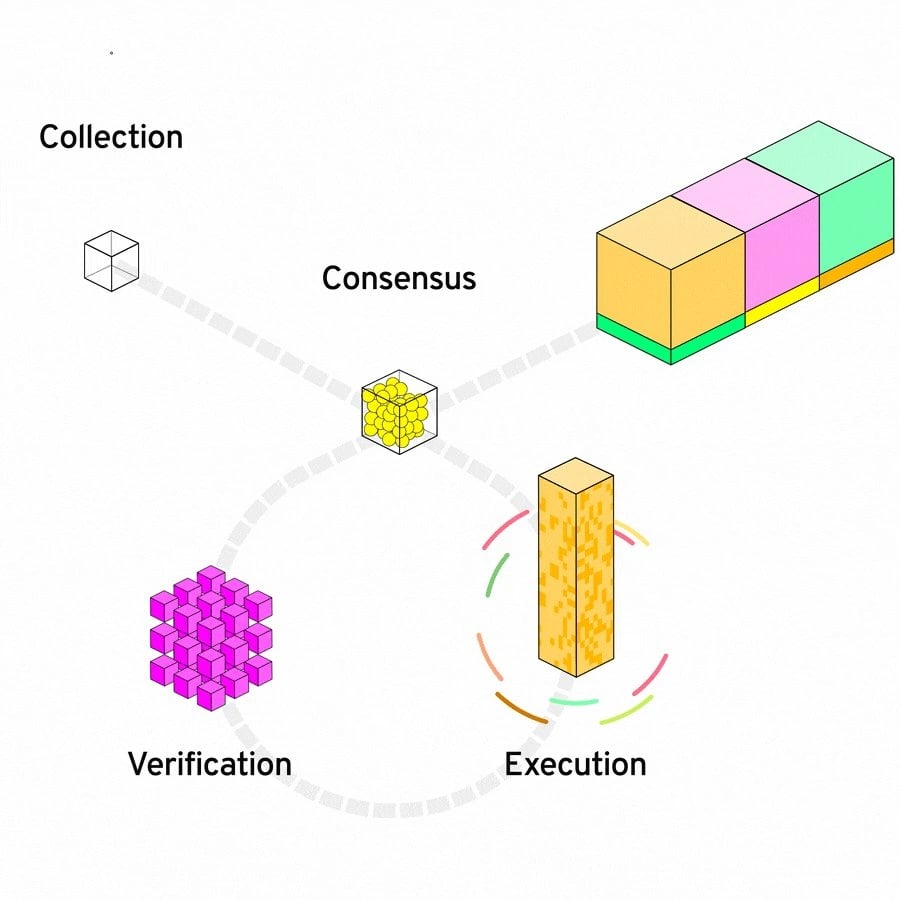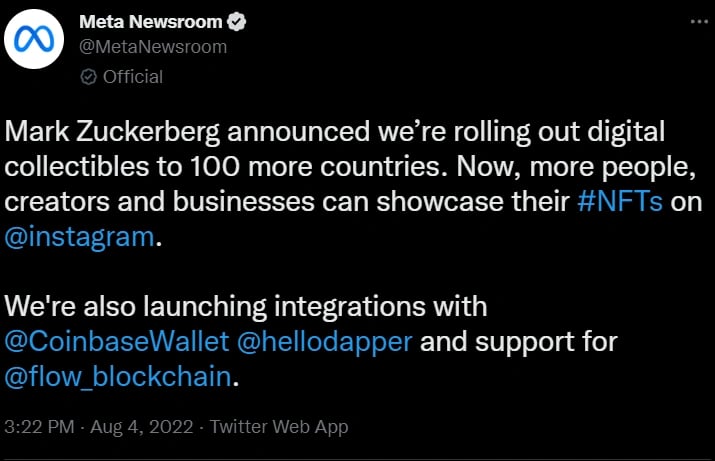Flow
Flow는 크립토키티를 만든 회사인 Dapper Labs에서 만든 탈중앙화된 레이어 1 블록체인입니다. Flow는 주로 Dapp, NFT 및 게임, 그리고 자체 암호화폐인 FLOW의 기반으로 설계된 블록체인입니다. [15]
개요
Flow는 높은 보안과 효율성을 달성하기 위해 비잔틴 장애 허용 (BFT) 합의 알고리즘과 지분 증명 (PoS)을 결합한 무허가형 네트워크입니다. 이 블록체인은 트랜잭션의 선택 및 순서 지정을 실행에서 분리하여 기존 PoS 블록체인의 처리량 제한을 극복하도록 설계되었습니다. [4]
Flow는 2020년에 출시되었으며, 개발자가 스마트 계약 및 Dapp을 실험할 수 있는 사용자 친화적인 개발 환경 도구인 Flow Playground를 제공합니다. 이는 Dapper Labs의 크립토키티가 2017년에 인기를 얻어 이더리움 네트워크를 막히게 한 후 자체 블록체인을 만들자는 아이디어를 촉발시킨 후 만들어졌습니다. [3]
인프라
Flow 블록체인의 인프라는 파이프라인 구조를 사용하여 처리량을 개선하도록 설계되었으며, 이를 통해 현재 블록이 실행되는 동안 다음 블록을 생성할 수 있습니다. 이 접근 방식은 단일 주기 처리 아키텍처를 사용하는 기존 블록체인과 다릅니다. Flow 블록체인은 또한 노드의 이질성을 인식하고 각 노드의 기능에 따라 특정 작업을 할당합니다. 노드에는 수집 노드, 합의 노드, 실행 노드 및 검증 노드의 네 가지 다른 역할이 할당됩니다. [5]
각 노드 유형의 기능은 다음과 같습니다.
- 수집 노드는 네트워크 연결 및 데이터 가용성을 개선하여 dApp을 더욱 효율적으로 만듭니다.
- 합의 노드는 트랜잭션의 흐름과 순서를 제어합니다.
- 실행 노드는 각 트랜잭션의 계산을 관리하고 속도를 향상시킵니다.
- 검증 노드는 실행 노드의 계산이 정확한지 다시 확인합니다. [1]

각 노드는 암호 경제적 인센티브를 통해 보상을 받습니다. 합의와 실행의 분리는 주관적 작업과 객관적 작업의 분리를 기반으로 합니다. 이러한 분리를 통해 소수의 데이터 센터만 실행 노드를 실행할 수 있지만, 계산 결과는 결정적이고, 검증 가능하고, 귀속 가능하고, 처벌 가능하고, 복구 가능하여 시스템의 탈중앙화를 손상시키지 않습니다. [5]
주요 노드
Flow 아키텍처는 관심사 분리 원칙에 따라 설계되었으며, 네트워크에는 합의 노드와 실행 노드의 두 가지 전문화된 역할이 있습니다. 이러한 두 노드 유형 간의 차별화는 객관적 작업과 주관적 작업 간의 구분을 기반으로 합니다. 객관적 작업은 객관적으로 올바른 답이 있는 반면, 주관적 작업은 결정적인 해결책이 없습니다. 기존 블록체인 아키텍처에서는 노드가 두 가지 유형의 문제를 동시에 해결해야 합니다. 그러나 Flow에서는 합의 노드가 주관적인 질문을 해결하고 실행 노드가 객관적인 문제를 처리합니다. [6][7]
합의 노드
합의 노드는 트랜잭션 데이터 다이제스트에서 블록을 형성하여 핵심 Flow 블록체인을 유지하고 확장하는 임무를 맡습니다. 제안된 블록의 수락에는 비잔틴 장애 허용 (BFT) 합의 알고리즘이 필요하며, 합의 노드는 계산 상태를 유지하거나 트랜잭션을 실행할 필요가 없습니다. 또한 실행 노드가 잘못된 출력을 생성했다는 주장과 같이 다른 노드의 슬래싱 요청을 판정합니다. [7]
실행 노드
실행 노드는 합의 노드가 결정한 순서대로 트랜잭션을 실행할 때 트랜잭션 결과를 결정하는 데 필요한 원시 계산 능력을 제공합니다. 실행 노드는 실행 영수증 형태의 암호화 증명을 생성하며, 이는 실행 노드의 주장이 잘못된 것으로 판명될 때 해당 주장에 이의를 제기하는 데 사용할 수 있습니다. 실행 노드는 올바른 것으로 알려지면 블록체인의 현재 상태에 대한 증거를 생성할 책임이 있습니다. 유효하지 않은 영수증은 거부되고 유효한 영수증은 수락되는 비잔틴 영수증의 검증 프로세스는 이 문서의 범위를 벗어나며 향후 작업에서 다룰 것입니다. [7]
원칙
비잔틴 오류 및 공격에 대한 보안을 보장하기 위해 Flow 블록체인에는 네 가지 핵심 아키텍처 원칙이 있습니다. 이러한 원칙은 오류가 감지 가능하고, 귀속 가능하고, 처벌 가능하고, 복구 가능하도록 보장합니다. 아키텍처는 네트워크의 정직한 노드가 결정적인 오류를 감지하고 다른 정직한 노드에 이를 증명할 수 있도록 보장합니다. 또한 Flow의 작업은 검증 가능한 임의 함수를 기반으로 노드 그룹에 임의로 할당됩니다. 감지된 모든 오류는 관련 작업의 책임 노드에 귀속되며, 오류가 감지되면 노드는 스테이크가 삭감되어 처벌됩니다. Flow 프로토콜에는 또한 시스템에 오류를 주입하려는 악의적인 노드에 대한 대응 조치 역할을 하는 결과 검증 및 잠재적 문제 해결을 위한 특정 요소가 포함되어 있습니다. 이러한 오류를 성공적으로 주입할 확률은 무시할 수 있습니다. [7]
역사
Flow x UFC
2020년 2월 26일, Flow는 혼합 격투기 조직인 UFC와 제휴하여 암호화폐 기반 디지털 자산과 Flow의 UFC라는 블록체인 게임을 만들 것이라고 발표했습니다. 이 게임은 수집가가 구매하거나 획득할 수 있는 고유하거나 한정판 아이템을 제공하며, 디지털 자산은 개방형 마켓플레이스에서 거래됩니다. 이 파트너십은 UFC의 열정적인 팬층을 통해 전 세계 MMA 팬을 위한 고유한 암호화폐 지원 경험을 창출하도록 설계되었습니다. 현재 UFC의 최고 피니시 클립인 스타터 팩, 모먼트, UFC의 상징적인 순간 또는 발언 클립인 HypeNFT로 구성된 NFT를 구매, 판매 및 거래할 수 있는 UFC Strike라는 플랫폼이 있습니다. [8][9]
NBA Top Shot
2020년 10월 1일, Dapper Labs에서 제공하는 NBA 클립을 구매, 판매 및 거래하기 위한 NFT 마켓플레이스인 NBA TopShot이 Flow 블록체인에서 출시되었습니다. 이 게임을 통해 사용자는 농구 역사에서 중요한 하이라이트를 나타내는 다양한 희소성의 멀티미디어 "모먼트"를 수집할 수 있습니다. 한정판 토큰에는 버저비터 샷과 같은 이벤트의 비디오 및 통계가 포함되어 있으며, 사용자는 관련 모먼트를 보여주는 특정 토큰 세트를 완료하여 매우 희귀한 토큰을 잠금 해제할 수 있습니다. [13][14]
CNN의 Vault
2021년 6월 16일, CNN은 Flow 블록체인에서 뉴스 네트워크의 41년 역사의 순간을 담은 NFT 컬렉션인 "CNN의 Vault" 출시를 발표했습니다. 이 컬렉션은 잠재적 구매자가 Blocto로 디지털 지갑 계정을 만들고 Stripe를 통해 신용 카드를 사용하여 NFT를 지불해야 하므로 법정 화폐를 사용하여 구매할 수 있다는 점에서 고유합니다. [10][11]

그러나 2022년 10월 11일 CNN은 커뮤니티에서 좋은 반응을 얻지 못한 NFT 프로젝트인 CNN의 Vault 종료를 발표했습니다. 많은 사람들이 CNN을 "러그 풀"이라고 비난하고 프로젝트가 처음 나왔을 때 팀이 한 약속에 대해 비판했습니다. CNN은 디스코드 서버에서 NFT 보유자에게 보상으로 FLOW 토큰 또는 스테이블코인으로 원래 민트 가격의 약 20%를 배포할 것이라고 사과했습니다. [12]
“배포는 각 수집가의 지갑에 입금된 FLOW 토큰 또는 스테이블코인으로 이루어집니다. 현재 세부 사항을 작업 중이지만 배포 금액은 소유한 각 Vault NFT의 원래 민트 가격의 약 20%가 될 것으로 예상합니다.”
Flow 토큰의 인스타그램 관련 버즈

2022년 8월, Meta는 더 많은 국가에 디지털 수집품을 출시하고 사용자가 인스타그램에서 NFT를 선보일 수 있도록 지원하는 것 외에도 플랫폼이 Flow 블록체인을 지원할 것이라고 트윗을 통해 발표했습니다. 이 발표로 인해 FLOW 토큰이 매수 압력을 받아 35% 이상 급등했습니다. [16][2]
해킹 및 논란
2023년 10월 말, Flow 생태계는 타사 애플리케이션의 익스플로잇 이후 블록체인 불변성에 대한 논쟁의 중심에 있었습니다. 공격자는 Joyride Games의 RCRDSHP NFT 마켓플레이스에 속한 스마트 계약의 취약점을 활용하여 약 6백만 달러 상당의 FLOW 토큰을 빼돌렸습니다. 익스플로잇은 애플리케이션 내에 포함되어 있었고 핵심 Flow 프로토콜 자체의 취약점은 아니었습니다. 이에 대응하여 Flow 팀은 Joyride와 함께 공격자의 계정을 동결하고 도난당한 자금을 회수하기 위해 네트워크 업데이트를 통해 "비표준 트랜잭션"을 제안했습니다. [17]
이 제안은 암호화폐 커뮤니티로부터 즉각적이고 상당한 반발을 받았습니다. 비평가들은 개입이 블록체인 불변성의 원칙을 위반하고, 개별 애플리케이션을 구제하는 데 위험한 선례를 남기고, 네트워크의 인지된 중앙화에 대한 우려를 제기할 것이라고 주장했습니다. 2016년 이더리움 DAO 해킹과 유사점이 있었습니다. 커뮤니티의 강력한 반대 이후 Flow 팀은 2023년 10월 31일에 "어떤 개입도 레드 라인"이며 탈중앙화에 대한 약속을 강화하면서 계획을 진행하지 않을 것이라고 발표했습니다. [17] [18]
